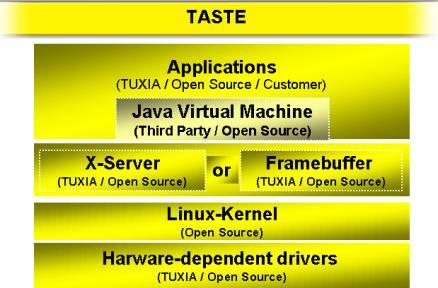Birth of a new Embedded Linux company
Dec 22, 2000 — by LinuxDevices Staff — from the LinuxDevices Archive — 1 viewsTuxia (Augsburg, Germany) today formally launched itself into the dynamic Embedded Linux market. The company intends to address what it terms “the rapidly expanding embedded Linux market,” with an emphasis on developing and marketing Linux-based software solutions for Internet appliances. Typical applications are expected to include webpads, set-top boxes, thin clients, and screen phones.
Tuxia was founded in 2000 as a “spin off” of the German company, Infomatec. The company has 80 employees worldwide, including 50 Linux software specialists, and has established local sales/support offices in Japan, Australia, Hong Kong, and the US. Tuxia reports that it received a venture capital investment of 20 million Euro during 2000.
Tuxia's initial Embedded Linux product family, expected to become available early in 2001, is a software suite called “TASTE” (which stands for Tuxia Appliance Synthesis Technology Enabled). TASTE derives from Infomatec's JNT Internet appliance oriented Embedded Linux technology.
In addition to licensing JNT from Infomatec, Tuxia also acquired development resources and international subsidiaries located in Hong Kong, Tokyo, Sydney, and New York subsidiaries. Infomatec will now be exclusively focused on the interactive TV market, while Tuxia will support existing JNT customers and will promote its new TASTE software suite for new customer projects.
The TASTE software suite (see diagram) will encompass a full stack of software components, including hardware drivers, Embedded Linux kernel, graphics engine, Java Virtual Machine, and application level code — much of which will be available under the GPL open source license.

This article was originally published on LinuxDevices.com and has been donated to the open source community by QuinStreet Inc. Please visit LinuxToday.com for up-to-date news and articles about Linux and open source.